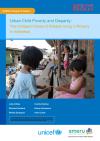Publications

ABSTRACT
This research aims to gain a deep understanding of children’s perspective on poverty as well as their everyday experience living in a poor household in an urban area. The analysis in this study is mainly based on the qualitative study conducted in six kelurahan (urban villages) in three cities: North Jakarta, Makassar and Surakarta. This study emphasizes grounded participatory research principle with children as the primary participants. During a series of individual and group interviews, focused group discussions, and storytelling and drawing activities with children aged 6–17 years old, children expressed how they perceive poverty, well-being, and everyday life struggle, and what expectations they have for the problems they encounter as well as how they adapt to and cope with them.
The findings show that most of the children associate the lack of access to basic amenities with the life experience of poor children. Children in urban areas experience poor public facilities, including clean water, public toilet, and playground. They also face constraints, such as cost barrier, to access education and health services. The existence of urban poor children living in illegal settlements is often not identified by the existing urban development policies, which in consequence has made these children to be excluded from attaining sufficient basic services. Furthermore, economic limitations also force children to work and this exposes them to risky environments. While parents struggle to make ends meet, children are often lacking in supervision and quality care which in turn leads to many problems.
Family, particularly parents, is one of the important factors which significantly affects children’s well-being. Parents’ poverty is considered to be the root of various problems faced by children. Parents’ poverty prevents children from enjoying a better living condition and accessing public services, such as education and health. Nevertheless, children highlight the crucial role of parents in their life; acting as the first and last resorts of support when children face problems. At a broader zone of interaction, peers and people in children’s neighbourhood can also give both negative and positive influences on the well-being of children. Among all layers of interaction, family is reported to be the most crucial aspect that influences children’s well-being. Therefore, any intervention and policies aiming to address the vulnerability and improving the resilience of urban poor children will need to consider family as a unit of intervention. On the other hand, children are found to have the ability to understand the complexity of problems they are facing every day and how they are interrelated; therefore, this can be seen as an opportunity to actively engage children in the intervention.
Keywords: child poverty, urban poverty, children’s voice
